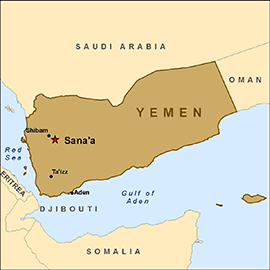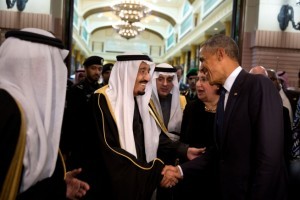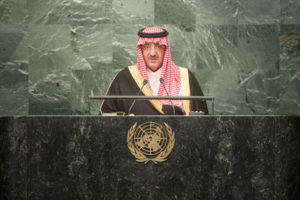U.S. military support for Saudi Arabia’s bloody air war against impoverished Yemen has escalated into a direct U.S. attack on Yemeni targets as retaliation for alleged missiles falling near a U.S. warship, notes ex-CIA analyst Paul R. Pillar.
By Paul R. Pillar
We are seeing today in Yemen a demonstration of how easily a supposedly limited U.S. involvement in an armed conflict becomes less limited, and how such involvement creates new enemies of the United States.
The deleterious entanglement of the United States in civil war in Yemen was already a major problem even before the events of the past week. The United States has associated itself with, and been providing indirect support to, the Saudi-led military intervention in Yemen. That intervention, especially through largely indiscriminate aerial bombardment, has been responsible for most of the severe civilian suffering in Yemen.
Since the Saudi air assault began last year, civilian casualties have been averaging 13 per day. Total civilian deaths in the war are approaching 4,000, with many more injured and still more homeless. The Saudi role in causing most of this damage and the U.S. role in facilitating it certainly undercut any criticism by those governments of Russia’s role in causing civilian suffering in Syria.
The newest step in the U.S. entanglement in Yemen is the direct application of U.S. firepower. On Thursday the United States fired cruise missiles at radar installations in territory controlled by the Yemeni rebels known as Houthis. The missile strikes were in response to a couple of unsuccessful firings from that territory of missiles evidently aimed at a U.S. warship.
The leadership of the Houthi movement denies involvement in the targeting of the U.S. ship. Whether or not there is any validity to that denial, the result is the same: U.S. involvement in the Yemeni civil war has escalated. That involvement previously consisted of behind-the-scenes but nonetheless obvious support to the Saudi offensive. Now it includes the U.S. Navy directly firing its weapons at Yemeni targets.
The Logic of War
Several aspects of the logic of war often cause external intervention to escalate beyond what was originally intended or desired. One involves making additional effort to achieve objectives that were declared at the time of the original intervention but have still not been achieved. Another involves responses to escalation on the other side that in turn was a response to the original intervention.

Saudi King Salman bids farewell to President Barack Obama at Erga Palace after a state visit to Saudi Arabia on Jan. 27, 2015. (Official White House Photo by Pete Souza)
Yet another, very much in play in this week’s events, involves the desire to protect and defend one’s own forces. The Pentagon described this week’s cruise missile strikes as retaliation necessary to protect U.S. vessels and their crews that were legitimately operating in the waterways of the Bab el Mandeb strait and the Red Sea. That is a valid explanation, but it carries little weight with Yemenis who simply see the United States firing deadly weapons at their nation.
The Pentagon said nothing about human casualties at the receiving end of the cruise missile strikes, but as Micah Zenko notes, the last time that the United States fired cruise missiles at a target in Yemen (in 2009), 41 civilians were killed.
The Houthi advances during the past couple of years are only part of a long and complicated story of armed strife in Yemen, the poorest of Middle Eastern countries. The issues and lines of conflict have involved contests for resources among different regions and tribes.
There also has been a sectarian dimension to the internal warfare: the Houthis are champions of Zaidi Shias, a large minority in a country with a Sunni majority. The identities of the contenders in the current round of civil warfare do not give any reason for the United States to be more against the side of the Houthis than for them.
Internal Disagreements
The Houthis are allied with longtime president Ali Abdullah Saleh, who was America’s man in Sana before he stepped down in 2012, amid popular protests and an assassination attempt that left him severely injured. The most threatening anti-U.S. element in Yemen has been Al Qaeda in the Arabian Peninsula, which is on the Sunni side of the sectarian divide; the Houthis are among the staunchest opponents of AQAP.

Mohammed Bin Naif Bin Abdulaziz Al-Saud, Crown Prince of Saudi Arabia, addresses the United Nations General Assembly on Sept. 21, 2016. (UN Photo)
In short, the United States did not previously — before getting involved in this war — have an enemy in the Houthis. Now, as a result of getting involved in the war, it does.
The usually cited rationale for opposing the Houthis is a relationship with Iran. The Iranians evidently have supplied the Houthis with some munitions, although most of the Houthis’ arms have come from within gun-saturated Yemen itself. That’s about as far as the relationship goes, beyond the partial religious affinity that may have been one of the motives for Iran giving some aid.
The Houthis are not proxies of Iran. When they seized the capital city of Sana it reportedly was against the advice of Iran — which in that respect was acting as a force for restraint, not destabilization. In any event, whatever aid Iran may have given the Houthis is dwarfed in size and destructive impact by the direct Saudi armed intervention.
What is being demonstrated in Yemen, besides being a serious problem in its own right, carries important lessons for policy toward internal conflict and external interventions in other places, such as Syria. One lesson is that supposedly limited interventions are likely — for reasons that include the need to protect one’s own service members — to become much less limited. (This dimension is routinely overlooked in discussions of establishing a no-fly zone or “safe zone” in Syria.)
Another lesson is that U.S. military interventions in this region have created more adversaries of the United States than they have eliminated.
Yet another lesson concerns the folly of defining Middle Eastern politics in terms of some grand alignment of opposing forces and then getting directly involved in any conflict that can be construed as being a clash of such forces. Even if the Yemeni civil war were a front in some kind of Iranian-led regional offensive — and as noted above, it isn’t — getting dragged into that war is less likely to serve U.S. interests than Iranian ones.
Letting its regional rival Saudi Arabia bleed in the quagmire that the Saudi intervention has produced may have been another motive for whatever aid Iran has given the Houthis. There certainly is no advantage for the United States in being involved as well.
Paul R. Pillar, in his 28 years at the Central Intelligence Agency, rose to be one of the agency’s top analysts. He is author most recently of Why America Misunderstands the World. (This article first appeared as a blog post at The National Interest’s Web site. Reprinted with author’s permission.)

Obozo attacked another country before even confirming that any missiles were fired. CNN is reporting that it could have been a glitch with the ship’s radar rather than real missiles. The US is fighting on al-Qaeda’s side in Yemen.
Keeping this strait open, would be a military necessity. What we experience may be part of a much larger plan, an escalation of the conflict in Syria. Watch out for a series og “false flag” events in USA and Europe, to facilitate NATOS direct involvment in the conflict.
test
Mr. Paul Pillar, than you for a well-written article about the futility of US intervention to create any good.
You wrote: “What is being demonstrated in Yemen, besides being a serious problem in its own right, carries important lessons for policy toward internal conflict and external interventions in other places, such as Syria. One lesson is that supposedly limited interventions are likely — for reasons that include the need to protect one’s own service members — to become much less limited…. Another lesson is that U.S. military interventions in this region have created more adversaries of the United States than they have eliminated.”
Two important lessons that also provide a powerful reason to vote for Trump—he will withdraw all US troops from everywhere around the globe. Yemen would have to solve its own problems and the US will stop creating more enemies.
The poorer the country, the less likely it is that it will submit to invasion and coercion from outside. Vietnam, Afghanistan, Yemen, Southern Sudan, the Maghreb triangle… to quote the newest Nobel laureate for literature: “When you ain’t got nothing, you got nothing to lose”.
This “retaliation” (similar to the UN relief convoy bombing in Syria and the sniper fire in Kiev) looks like a Carter/Nuland re-run that is supposed to get Americans all fired up about an attack on “our boys”. But we are all jaded now, cynical, we’ve seen this movie before, and we are sick and tired of war, war, war, because the scraps from the overladen tables of the rich no longer fall into the outstretched hands of the Nouveau Poor.
The conclusion must be that neocons are total boneheads with tunnel vision and no capacity for reflection. Think of the neocon as a coyote, caught in the war trap and gnawing off a leg in order to escape, only to get caught in the next trap because the meat was so enticing. Even if they have an endless supply of legs to get rid of, one day their fangs will be dulled and no longer be able to do the job.
If the US government did it, then we have to wonder if it happened. How can anyone believe liars? Be that as it may, those cruise missiles were probably worth more than the entire nation of Yemen. It’s pure genius! No wonder we have a national debt of at least $20,000,000,000,000. https://waitforthedownfall.wordpress.com/backwards-thinking/
Do the Houthis even have access to missiles with a range to bring down ships at sea? Or is this just another Gulf of Tonkin false flag created to allow America to enter yet one more war? The Iranians have been very aloof from this fracas so far, in spite of American and Saudi accusations, and it seems doubtful that they would have supplied such missiles to the Houthis to avoid unwanted entanglements.
The Obama administration seems to be working overtime to ensure that this country is irrevocably into a major war with Russia and Iran before the next administration, possibly before the coming election, which they are wailing has been tampered with by Russian interference. The people who control everything in the media are even using the cartoon show the Simpsons to slander Putin, Russia and Trump as hijackers of American democracy, which would be fantastic if it weren’t so pathetic. Yet the morons who respond on the forums seem to believe all that idiocy.
Vice Idiot of the U.S. Joe Biden, when he not feathering his son’s nest with Ukrainian sinecures, is now personally warning Putin that America is about to unleash cyber warfare on his country in payback for the putative Russian hacking which apparently requires absolutely no evidence whatsoever. Cyber war is a state of war, no less than dropping bombs on a country. Is Putin supposed to sit back if the CIA knocks out his country’s power grid? Biden and his boss Obama are insane war mongers. Eric Zuesse goes even further and suggests that this administration has threatened Russia with nuclear war if Putin doesn’t quickly surrender and stand down in Syria.
Our leaders exist in a state of madness and have brought this country to the brink of the abyss. Just what is it they hope to accomplish that is worth risking the extinction of the human race? It CANNOT be who heads the regime in Syria. That makes zero sense. The payoff is nowhere commensurate with the risk. Even bringing down the Russian government (which is an inherently mad goal) cannot be worth mutual annihilation, even in the minds of maniacs like Obama, Clinton, Biden and the rest. Just who are these creatures and what is their true goal?
Very recent story:
(CNN)The Navy destroyer USS Mason fired countermeasures in the Red Sea on Saturday after it detected what it believed were incoming missiles.
Officials Saturday night were uncertain about what exactly happened, if there were multiple incoming missiles or if there was a malfunction with the radar detection system on the destroyer.
If true, this is the third attack claim. That “malfunction” bit worries me though. Why is this even being announced without lead-pipe certainty?
http://www.cnn.com/2016/10/15/politics/uss-mason-fired-on-again/
It was probably just another “mistake”, like the one-hour bombing of the Syrian Army a few weeks back. Can mistakes ever take one hour? Well, if it says so on CNN, then it must be true.
It could have been a Navy test to see how well the rebel radar can track their missiles and if any rebel interceptors would be fired back.
Questions upon questions. I get it that the Obama Adminstration was against allowing 911 families from sueing the Saudi’s. Yet when will our media inform the American public that our Air Force is doing bombing runs in Syria to aid al Nursa which is Al Qaeda, and now with this Yemeni conflict our Navy is basically firing missiles at the very people who are fighting Al Qaeda. When did we switch sides? Apparently the U.S. will do anything for the Saudi royals, and our beloved Israeli’s. Nothing makes sense anymore.
Hmmm. The Sauds have been bombing there for awhile now, I guess they just happen to leave some Radar for their suppliers to target? A child could see through this BS. Doesn’t say much for most of the Western World.
That’s an interesting question, so I went looking for an answer.
So it’s a jury-rig launch system. As such, they’re likely to run out of missiles sooner rather than later. For the US ships that’s good, for even old missiles like this might score if launched in salvos.
Many knowledgeable observers predicted the Bush/Cheney war on Iraq would destabilize the Middle East. Did any believe it would be this disastrous? Someone should tell CNN about this potential debacle enhancer in Yemen. The corporate pressitutes at CNN seem only to know about Trump’s accusers with a slight aside to the Clinton campaign’s shenanigans. But I guess they have learned from Les Moonves of CBS that is where the money is.
Independent commentators have suggested that, by supporting the Saudis in this effort, the US is committing war crimes, a view which I share.
Michelle got herself all upset about The Donald’s crude behavior towards women, but I didn’t listen to all her rant. Did she by any chance say anything about Barack’s participation in war crimes in Saudi Arabia, Israel and other parts of the world?
Bill – it was a very convenient and timely “upset” on Michelle’s part, one that most likely miraculously disappeared as soon as the cameras were turned off. No, I’m sure Michelle isn’t losing any sleep over the dead people in Afghanistan, Iraq, Syria, Libya, Yemen, Ukraine. She’s more interested in fashion, she says.
I guess the Obama’s are trying to maintain the status quo just long enough for them to cash in too with speeches and the like.
Phoney and contrived.
It is very interesting to note that in some reporting it has been claimed that the Houthis launched “cruise missiles” at a US Navy ship. Cruise missiles are very complex weapons which are not normally part of the armament of an efficient guerilla organization such as the Houthis. Thus, if this is the story that US mainstream journalists are trying to embed in people’s consciousness it is then highly unlikely that the Houthis had such a capability. And nor would they have radar stations unless there is evidence that they have captured such equipment, which I do not believe has ever been reported.
it is most likely that a squad of the u.s. navy’s celebrated elite commandos launched a couple man portable rockets at u.s. ships from the Yemeni coast. followed up by some tomahawks vapourizing some Houthi soldiers listening to the radio, in some mud-huts with aerials sticking out of it (or “Radio Stations” to the u.s. inteleejunz).
This certainly appears to be a very deliberate re-run of the Gulf of Tonkin incident, and the US should suffer the disbelief of other nations as a result. Just pretend that we were fired at with no records and no evidence of damage whatsoever. They could not have known that there were missiles being fired and falling short, except for radar evidence. So if there is no evidence, there was no incident, and the perpetrators should be sent to a court martial.
It’s likely the US ships actually were attacked, for recently a UAE boat was nearly destroyed by some kind of missile. Here is what the Navy is said to have used for the defense:
An internet search indicates the SM-2 missiles cost $400,000 each. The Sea Sparrow wiki says the unit cost is $165,000, and the Nulka decoy a cool $500,000. I’d venture a guess that this ordnance was necessary under the circumstances. Now whether or not US Navy ships ought to be there at all is another question.
Even if, as the second guy speculates, it wasn’t a gulf of Tonkin incident (I suspect it was because of convenience and timing) the Yemeni have the right to defend themselves against foreign powers besieging them, and it is, therefore, predictable blowback if real, and a cynical ploy if false.
test
Even USA has admitted fire missiles to Yemen, and by the same token,what and why the warship are doing over there? really doing their own thing? as the incident of tonkin what usa warship were doing overthere?